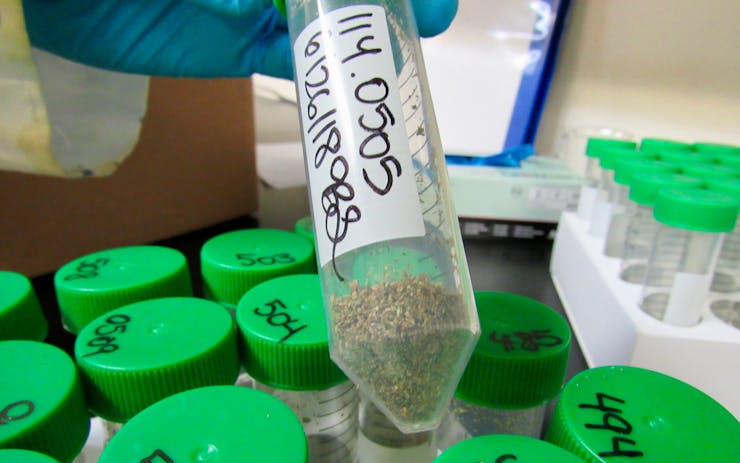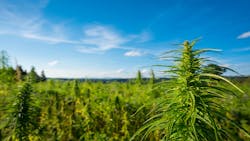California’s legal recreational cannabis supply is now cleaner than the state’s food. Starting July 1, all cannabis products sold at licensed stores must undergo rigorous analytical testing before they can be sent to retailers.
More than two dozen licensed labs are charged with conducting the assays for potency and purity, which have been phasing in since the new year. Stores either ship samples or courier them to the labs, which try to turn around results in five days.
What’s Being Tested in Labs
Here’s what labs are testing for, as required by the state Bureau of Cannabis Control.
Water Content
You got to love California — a state so dedicated to quality you can’t sell cannabis that’s too dry or wet. It’s an old dealer’s trick to sell wet weed for higher weight. But the weight of water in a sample can screw up all other lab measurements of it. Nothing above 13% water content, guys.
THC
The star of the show. THC is cannabis’ main psychoactive ingredient. Labs use a gas chromatograph or high pressure liquid chromatograph to detect THC levels in raw bud, extracts or edibles. THC content is expressed as a percentage of the dry weight of flower or extract (ie, 15% THC in flower), or as milligrams of THC in an edible (a 100 milligram THC chocolate bar).
Buy Clean, Tested Cannabis from Licensed Shops with Leafly Finder
CBD and 6 Cannabinoids
Cannabidiol (CBD) is the second most common active ingredient in cannabis and can decrease pain, inflammation, spasms and anxiety without the mood lift of THC. Labs must determine the amount of CBD in any given product, as well as more exotic therapeutic cannabinoids. Interest is surging in molecules CBN or THC-V to get specific effects like sleep or appetite suppression. The list of tested cannabinoids also includes THC-A, CBD-A, and CBG.
67 Pesticides
Labs must look for 67 pesticides from a list based on federal “organic” standards. Pesticides like myclobutanil turn to hydrogen cyanide when burned and inhaled. Numerous field reports have led researchers to conclude that a significant percentage of the state’s cannabis supply was previously tainted with such chemicals. Lab fail levels for myclobutanil are .02 parts per million. For the notorious pesticide malathion, it’s .01 parts per million.
Residual Solvent
Hash makers use butane, propane, and other volatile chemicals to make butane hash oil and other highly potent cannabis extracts. But they have to get those solvents out of the hash before they can sell it. California labs are required to fail any hash that tests above a certain threshold for residual solvents, measured in the parts per million or billion. The fail level for butane in inhaled goods is 800 parts per million. For benzene it’s one part per million. One problem that has yet to be solved: Tincture makers often use grape spirits, which show up as alcohol and thus fail the state-mandated lab test. “We have some alcohol tincture makers that are freaking out,” said Joshua Richards at Anresco Laboratories in San Francisco.
Mold, Mildew, Fungus
Labs must culture agar plates or run DNA analysis on samples to determine microbial impurity. Too much bacteria load and the product fails and can’t be sold. Aspergillus fungus on raw cannabis was implicated in at least one California health episode. Many organic-like growing techniques yield flower that has failed these pathogen tests. So does a lot of hash made by ice water and sieving, called bubble hash. Some say the standards are set too high. Labs test a one-gram representative sample and if any bugs grow, the whole batch fails.
Foreign Material
The time-honored tradition of finding some dog hair in your bubble hash is sunsetting. All products get visually inspected for dirt and hair and stuff.
Homogeneity
Edibles servings have to have a consistent dose each time. If they vary by more than 10 percent THC, they fail. Not so bad, unless you’re a micro-dose product maker. Nailing a 5 mg chocolate covered blueberry to within 10 percent variance is a nightmare.

Precision microdosing edibles is no easy task. PLUS Gummies of California has figured it out though. (Courtesy of Plus)
In the Future
More quality assurance standards are coming to California this winter when phase 3 of testing regulations kick in. They include testing for:
Terpenes
At the end of 2018, some cannabis products will show their terpene content on the label—allowing consumers to buy by chemotype, not strain name. This will be a watershed moment in cannabis consumer rights.
Heavy Metals
Cannabis is a so-called “bio-accumulator” crop. It sucks up all the properties of its soil, good and bad. That makes it good for soil remediation, but bad for patients potentially exposed to heavy metals like cadmium, lead, arsenic and mercury via their medicine.
Mycotoxins
Fungi aren’t in themselves bad. Who doesn’t love a good grilled portobello? But some fungi excrete potent poisons. Those poisons are called mycotoxins, and soon labs will have to look for them, rather than just the fungi itself.





